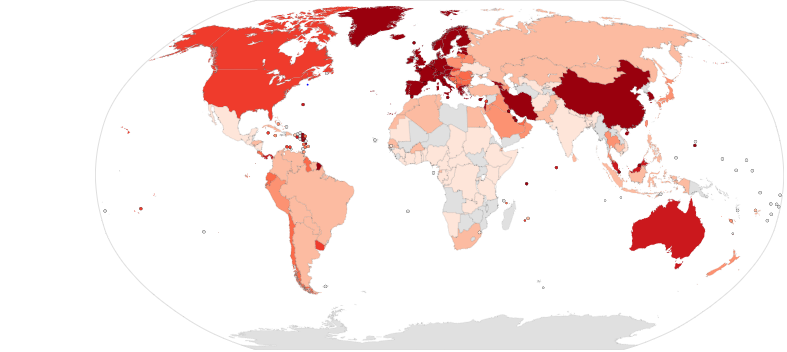Quarantine’s Many Impacts on Mental Health
December 10, 2020
Covid-19 has had a powerful effect on the world, being labeled a global pandemic and infecting nearly 67 million people. Its widespread presence has called for an international quarantine, which has undermined many industries, such as the movie and airline industry, which are suffering greatly due to the circumstances. However, economies and industries are not the only major effects that are straining our modern world. With the quarantine confining many of us within our homes and restricting many everyday occurrences such as attending school in person, the mental health of many is bound to change as our conditions shift during the battle against Covid. These alterations to our mental health are harmful because the amount of stress, fear, and anxiety that accumulates during the social isolation and changes in the environment are oftentimes too overbearing to handle. In addition, the effects brought on by Covid vary but each has established an underlying presence and each of these effects has changed mental health drastically over the past few months. As our circumstances continuously change, the mental health surrounding Covid will shift according to our situation. Ranging from unhealthy habits to extreme amounts of stress due to the home restrictions, and retracting a mental illness such as depression or anxiety. All in all, these factors have contributed to mental health declining and are a part of what makes quarantine difficult to handle and persist through.
First and foremost, with the conditions that have been established because of the Quarantine, many will resort to unhealthy habits. This is due to the fact that remaining within our homes for a prolonged period of time is deadly to the human mind, courtesy to social isolation because seeing friends, family, or any loved ones are heavily discouraged. The stresses of adapting to work from home and school at home have had their toll as well. In fact, according to Heather R. Johnson, the author of The Impact of Covid-19 on Mental Health, disruptive habits such as “panic buying, binge-watching TV, and other unhealthy behaviors have also been reported.” Correspondingly, Johnson insists that quarantine may incline “behaviors like online gambling”. Consequently, Quarantine causes people and individuals alike to indulge in adverse behavior, some entering the extreme and committing themselves to acts such as online gambling in order to cope with the effects of social isolation.
Secondly, Stress is another prevalent factor that has caused quarantine to feel extremely demanding and taxing. Stress is a natural inhibitor for us as it accumulates after working for long hours under tight conditions such as deadlines and social isolation, courtesy of the global quarantine. For this reason, our exhaustion and thought process lags behind, making us feel unsatisfied and restless. Additionally, the stress can cause a person to attract a severe mental illness, like depression or anxiety. On the one hand, in her article, Mental Health and the Covid-19 Pandemic, Betty Pfefferbaum, argues that in a review about psychological sequelae, stress, depression, and other arrays of negative emotions continued even after restrictions were lifted. As a result, the feeling of overwhelming pressure is abundant and threatens a person’s life, taking full control of it and worsening it. “In the current pandemic, the home confinement of large swaths of the population for indefinite periods, differences among the stay-at-home orders issued by various jurisdictions, and conflicting messages from government and public health authorities will most likely intensify distress.” She says.
Thirdly, mental illnesses. As mentioned beforehand, stress is the medium in which mental illnesses manifest within the human mind. While the stress is detrimental to the person’s physical body, mental illnesses are severe and can undermine an individual’s mentality, causing discord and disruptions in their daily routine and life. These mental illnesses can worsen chronic health and mental problems, as well as alter eating and sleeping patterns. Furthermore, Tanja Michael, a psychologist studying at Saarland University, and the author of Impact of COVID-19 on Public Mental Health and the Buffering Effect of a Sense of Coherence, states that 2 reviews revolving around mental health during Covid discovered a coherent negative impact on mental health, with “16-18% of participants showing symptoms of anxiety and depression”. Therefore, the influence of Covid on mental health has proven to be detrimental, changing people’s lives for the worst at a consistent rate over the duration of this quarantine.
In conclusion, Covid has caused an overall decline in mental health, causing people to suffer from mental illnesses, being overwhelmed by stress, and resulting in people picking up unhealthy habits. Nevertheless, while the effects are severe, it is not irreversible. Lifelines are always available, practicing healthy habits during quarantine such as maintaining a coherent schedule and relaxing are all crucial. Countermeasures such as exercising or yoga can help calm the mind and get rid of stress. These are all methods that can be used to lessen the heavy impact of Covid. Regardless, Covid’s effects and it’s mere presence is powerful, but by taking countermeasures, one can guarantee their mental health and fight back against Quarantine.




